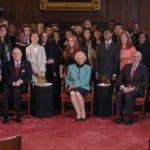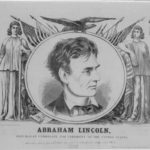On December 18, 1944, the U.S. Supreme Court handed down one of its most controversial decisions when it upheld the government’s decision to intern all persons of Japanese ancestry (both alien and nonalien) on the grounds of national security. Over two-thirds of the Japanese in America were citizens and the internment took away their constitutional rights. In this lesson, students evaluate the consequences of past events and decisions related to the Supreme Court case Korematsu v. United States (1944). They consider the challenges involved when trying to balance civil liberties and national security during threatening times and reflect on the lessons learned about civil liberties from the justices in the Korematsu case.
Civil Liberties
Civil liberties are the basic individual rights of all citizens, as expressed in the Constitution and (especially) the Bill of Rights, and reinforced by the 14th Amendment. Check out the National Constitution Center’s Civil Liberties learning module.
Habeas Corpus: The Guantanamo Cases
One of our oldest human rights, habeas corpus safeguards individual freedom by preventing unlawful or arbitrary imprisonment. This documentary examines habeas corpus and the separation of powers in the aftermath of the 9/11 attacks as the Supreme Court tried to strike a balance between the president’s duty to protect the nation and the constitutional protection of civil liberties in four major Guantanamo Bay cases: Hamdi v. Rumsfeld, Rasul v. Bush, Hamdan v. Rumsfeld and Boumediene v. Bush.
Closed captions available in English and Spanish.
Selective Incorporation
Teachers can use this lesson as a supplemental resource in their federalism unit, their Supreme Court unit, or their civil rights and civil liberties unit to help students understand how some rights apply to the states and others don’t. This lesson includes a video from Sal in which he describes the basic concept of selective incorporation, a video about McDonald v. Chicago in which Kim interviews Alan Gura and Elizabeth Wydra about the facts and outcome of the case, and practice questions aligned to the new AP Government and Politics exam.
Rights at Risk in Wartime
The terrorist attacks on Sept. 11, 2001, stunned the nation. As commander-in-chief, President George W. Bush responded quickly but soon all three branches of government would be embroiled in the struggle to balance national security with the protection of individual liberties amid a war on terror. This lesson plan is based on the Annenberg Classroom video “Habeas Corpus: The Guantanamo Cases.” The four cases are examples of how the Supreme Court, the president and Congress fought to balance national security and civil liberties during the war on terror. At the heart of each case was the constitutional right of habeas corpus, the right to have one’s detention or imprisonment reviewed in court.
A Conversation on the Importance of the Japanese Internment Cases

Justices Stephen G. Breyer, Sandra Day O’Connor and Anthony M. Kennedy discuss two landmark cases, Korematsu v. U.S. and Hirabayashi v. U.S., in which the Supreme Court tried to strike a balance between individual rights and national security during wartime. The cases stem from President Franklin Roosevelt’s 1942 executive order that mandated the relocation of Japanese and Japanese Americans to internment camps. This video complements the documentary Korematsu and Civil Liberties.
Amendment Worth A Thousand Words
With many pictures posted all over every social media platform, the #amendmentworthathousandwords’ overall mission will be to enlighten many of the rights promised to people by the Constitution. Through this challenge, many will become aware of their rights and what the Constitution does not only for them, but for all Americans as well! Lesson plan by Eboni Jenerette
Lesson 2: The Federalist Defense of Diversity and “Extending the Sphere”

This lesson involves a detailed analysis of Alexander Hamilton’s and James Madison’s arguments in favor of the extended republic in The Federalist Nos. 9, 10 and 51. Students consider and understand in greater depth the problem of faction in a free republic and the difficulty of establishing a government that has enough power to fulfill its responsibilities, but which will not abuse that power and infringe on liberties of citizens.
Abraham Lincoln’s Fragment of the Constitution & the Union (1861): The Purpose of the Union
Renewal of the USA PATRIOT Act (SIM Lesson Plans)
The materials in this curriculum are designed to enhance the Institute’s Senate Immersion Module (SIM) experience, but can also be used separately. The SIM program is an educational, role-playing experience, developed to engage new generations of Americans. The Institute encourages classroom preparation for the SIM, active play at the Institute, and debriefing at the end of the experience.
